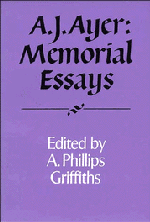Book contents
- Frontmatter
- Contents
- Preface
- A Defence of Empiricism
- Ayer: the Man, the Philosopher, the Teacher
- Ayer's Place in the History of Philosophy
- AYER'S ATTACK ON METAPHYSICS
- Ayer and World Views
- Language, Newspeak and Logic
- On the relation between Common Sense, Science and Metaphysics
- Logical Positivism and Intentionality
- Probability and the Evidence of our Senses
- Seeing Qualia and Positing the World
- Three Varieties of Knowledge
- The Importance of ‘If’
- Ayer's Ethical Theory: Emotivism or Subjectivism?
- Subjectivism and Toleration
- An Interview with A. J. Ayer
- Notes on Contributors
- References
- Index
Ayer and World Views
Published online by Cambridge University Press: 01 July 2010
- Frontmatter
- Contents
- Preface
- A Defence of Empiricism
- Ayer: the Man, the Philosopher, the Teacher
- Ayer's Place in the History of Philosophy
- AYER'S ATTACK ON METAPHYSICS
- Ayer and World Views
- Language, Newspeak and Logic
- On the relation between Common Sense, Science and Metaphysics
- Logical Positivism and Intentionality
- Probability and the Evidence of our Senses
- Seeing Qualia and Positing the World
- Three Varieties of Knowledge
- The Importance of ‘If’
- Ayer's Ethical Theory: Emotivism or Subjectivism?
- Subjectivism and Toleration
- An Interview with A. J. Ayer
- Notes on Contributors
- References
- Index
Summary
As we all know, in Freddie Ayer's famous book Language, Truth and Logic metaphysics received short shrift. Metaphysical assertions were dismissed as being all nonsensical {LTL, 2nd edn, 41). In the work in question Ayer clearly tended to equate metaphysics with what Professor W. H. Walsh was to describe as ‘transcendent’ (as distinct from ‘immanent’) metaphysics (Walsh, 1963). This tendency is also discernible, I think, in the 1949 debate between Ayer and myself on logical positivism. After all, my defence of metaphysics was largely prompted and certainly strengthened by what I believed to be the religious relevance of metaphysical philosophy. A lot of what Aristotle would have described as ‘first philosophy’ and what some later philosophers would have classified as ‘ontology’ Ayer would have called ‘philosophical analysis’. What he was primarily concerned with undermining was any claim by metaphysicians to be able to extend our knowledge of what exists, of the Absolute or God for example, by metaphysical arguments.
Ayer continued to believe that a claim to possess factual knowledge about reality should not be seriously entertained unless it was possible to mention some observation statement or statements which would be relevant to showing whether the claim was or was not justified. He never renounced an empiricist approach to philosophy. At the same time he came to abandon his initial wholesale condemnation of metaphysics as so much unintelligible nonsense in favour of a more discriminating attitude. I do not think that he was ever much interested in metaphysics. It remained on the periphery of his interests. His change of attitude was doubtless largely due to reflection on what had been said by colleagues whom he respected.
- Type
- Chapter
- Information
- A. J. Ayer: Memorial Essays , pp. 63 - 76Publisher: Cambridge University PressPrint publication year: 1992
- 1
- Cited by

